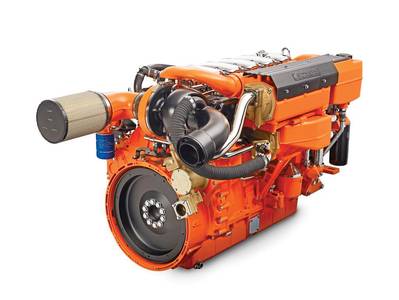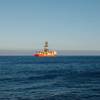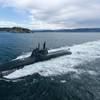Denet Towing Repower Saves 20% in Fuel
Jerrold Denet, owner of Denet Towing in Boothville, La., is as straight forward as they come. When asked why he started his towing company in 1982, the response was incredulous: “Why did I start it? I started it to work and to make money!”
When asked why he repowered his M/V Ocean Pride from a 12-cylinder V with a pair of six-cylinder in—line Scania DI-13 continuous duty engines with 450hp @ 1800 rpm through Twin Disc MGX 516 marine gears, the answer was similarly blunt: “This is where my money is best spent,” said Denet. “We are producing more power and burning less fuel.
We were burning 23 gallons an hour with the V12 and with Scania power we’re burning 18 gallons an hour. We’re saving 120 gallons in a 24 hour period, and at $3.25 per gallon it adds up fast.” The Scania engines were delivered through NRE, the engine maker’s distributor in the Gulf.
“We are consistently focused on Scania’s innovative design, performance, and reliability, as well as our ability to increase our customers long term profitability,” said Sheldon Murdock, Sales Manager, Marine, Scania. “We combine this with excellent customer service and parts availability.”
Denet Towing embodies much of the change sweeping the workboat market today.
With 11 boats and 30 employees, companies such as Denet are squeezed mightily by larger competitors with deeper pockets that have the ability to more comfortably absorb new, costly regulations, and to rationalize these investment costs across a fleet of hundreds.
Owners like Denet – a company which primarily serves the needs of the shallow-water oil drilling industry – must invest wisely or perish.
“This industry has changed a lot (in the last 30 years), and you have to be more competitive you’re your pricing,” said Denet. “From a selling point, I can go and sell more horsepower for less money. The boat that I have with the Scania engines is the most economical choice.” The 65-ft. Lugger Tug M/V Ocean Pride was built by Rodriguez Ship Builders in Bayou Labatre, AL, in January 1998, powered by a Detroit Diesel 12V71. It was repowered three months ago, and another of Denet’s Lugger Tugs is scheduled to be repowered by the end of 2014.
The results to date have been outstanding according to Denet, saving four to five gallons per hour, or 120 gallons and nearly $400 per day.
“We picked the Scania engines because of the fuel consumption savings, and for EPA reasons,” said Denet. Another big factor was the fact that it was an In Line engine, giving the boat lower torque.
“We cater to oil field in shallow waters, and the low torque helps us move more efficiently through shallow areas,” said Denet.
“So we’re producing more power, it has more torque, and it is turbocharged instead of naturally aspirated, giving more power with less fuel.”
As the Scania name is still a relatively new one in North American workboat circles, the company has come to the market with the goal of being a leader by providing the most innovative products and services available, and focusing on long term business partnerships. That said, Murdock does admit that “It has been a challenge to be seen as an unknown brand in the North American market, but globally Scania has seen that good results are a matter of implementing the correct methods.”
While Denet stressed the importance of price – and he was specific to mention that in the hunt for new power, the Scania units provided equivalent power with better fuel consumption for nearly half the price of other offers – he stressed too that the long-term relationship with the engine maker is dependent largely on the company’s ability to efficiently service and fix any problems that may arise.
With six Lugger Tugs and five Fast Runners, Denet Towing doesn’t have the capacity for extended work stoppages.
Looking ahead, Murdock of Scania sees ample opportunity to serve boat owners of every size and locale: “In our displacement and output range, EPA Tier 3 went into effect on January 1, 2014,” said Murdock. “We saw a decline in both new construction and repowering markets directly after the new emission standards went into effect, as it seemed many customers tried to finish projects prior to the new legislation. In the previous quarter we have seen increased demand and business has been going very well. We expect to see steady growth in 2015.”
“From a selling point, I can go and sell more horsepower for less money. The boat that I have with the Scania engines is the most economical choice.”
Jerrold Denet, Owner, Denet Towing in Boothville, La.
(As published in the November 2014 edition of Maritime Reporter & Engineering News - http://magazines.marinelink.com/Magazines/MaritimeReporter)













